#kia
Hyundai Recalling 129,000 U.S. Cars Over Engine Fire Risk, Fined By Regulators
Hyundai Motor Co. is recalling roughly 129,000 vehicles sold in the United States over an engine issue that may pose a fire risk. While we’ve been generally kind to the manufacturer of late, thanks to a rather good lineup of well-designed vehicles, it’s been mucking things up with recalls.
Last week, Hyundai Motor Group (including Kia) agreed to shell out up to $210 million in civil penalties after American safety regulators said it was dragging its feet on enacting a recall that encompassed 1.6 million automobiles. Apparently, there was some confusion on what needed to be reported to the National Highway Traffic Safety Administration. But let’s begin with the latest problem covering the company’s 2.4, 2.0, and 1.6-liter engines.
Hyundai Promises New EV Platform That Won't Have Terrible Range
If you feel like you’ve had your fill of news relating to electric cars, you’re not alone. Sadly, that’s just about all the industry is willing to let out of the bag right now. Whether you’re trying to pump staffers for information using sweet talk or waggling a crowbar in front of their face, they don’t have much else to discuss ahead of the holidays.
But that doesn’t mean there can’t be good news. Hyundai Motor Group, one of the few manufacturers that (mostly) hasn’t left us clenching our teeth when announcing decisions, has announced it’s building an all-new, electric platform that won’t have a laughably pathetic rang e. Unveiled in Seoul, South Korea, on Wednesday, the Electric-Global Modular Platform (E-GMP) promises sports-car levels of acceleration, outstanding flexibility, and production models boasting ranges in excess of 300 miles.
Hyundai Secures New Chairman: Nepotism or Sagacity?
It’s often difficult to keep track of who is heading which automotive conglomerate. Topps never issued a trading card line devoted to industry professionals and there’s no show we’re aware of that catalogs the corporate history of car manufacturing focused entirely on management. Whenever someone is named in a car documentary, it’s only because they were incredibly important to the program or instrumental in seeing the company through a difficult period. That, or they happened to be one of those people’s damned children.
Nepotism is a problem in most industries but the automotive sector seems to be among the worst offenders. While some amount falls within the acceptable parameters rooted in the familial ties of yesteryear, when these businesses were much smaller entities, plenty of placements seem designed to keep wealthy offspring occupied through adulthood. It’s probably a sweet gig if you can get it but the phenomenon itself makes it difficult to determine which blood-related hires are placeholder people and who’s the genuine article.
For example, Hyundai Motor Group has just appointed Eui-Sun Chung (49) as its new chairman. He will be succeeding his father, Mong-Koo Chung (81), and comes from the automaker’s founding family. But there’s plenty of evidence to suggest Chung may actually be the ideal man for the job.
2021 Kia Sorento: Here It Is
There’s a whole slew of virtual vehicle launches happening this month and next, and Kia took their turn today, unveiling the 2021 Kia Sorento.
More Hyundai/Kia Fire Recalls Related to ABS Controller
Hyundai and Kia are recalling nearly 200,000 vehicles in the United States over a potential short in the antilock brake system of select models. Problem vehicles include around 180,000 examples of the 2019-21 model year Hyundai Tucson and roughly 9,000 Kia Stingers from 2019.
Based on the recall information provided by the manufacturers, around six Stingers have caught fire over the issue. Regulators have confirmed that the issue lies in the ABS control module and that combustion is still possible when the vehicle has been shut down. That has led us to believe this might be related to an earlier recall involving 283,803 Kia Optima sedans (MY 2013-15), 156,567 Kia Sorento crossovers (2014-15), and 151,205 Hyundai Santa Fe Sport crossovers (2013-15). Each of those models ran the risk of brake fluid seeping out onto the hydraulic electronic control unit and causing a fire.
Kia Reveals Broader Range of Stinger Flavors, New Engine
The unlikely Kia Stinger enters the coming year with mild design and content changes in tow, but one thing that isn’t disappearing is choice. Come 2021, there’ll be more of it, at least as far as powertrains are concerned.
Rather than swap out the model’s base engine for a more potent — but pricier — mill, Kia decided to leave well enough alone and slot something hotter between the entry-level 2.0-liter four-cylinder and twin-turbo 3.3-liter V6.
Fresh Venom? Updated Kia Stinger Debuts Overseas
Everyone’s favorite rear-drive South Korean liftback sedan, the Kia Stinger stands to gain a refresh for the coming year. Appearing in its home market Wednesday, the ’21 Stinger aims for added aggression, but Kia didn’t lose its mind applying this facelift.
Details on powertrain alterations, if there are any (there might be!) are off the table for now, but the rest we can see with our own eyes.
Crossover Injection Aids Kia's COVID Recovery
U.S. sales results, at least those that we know of, were a mixed bag in July. Automakers foreign and domestic are busy replenishing inventories drained by a two-month shutdown of U.S. manufacturing; for many, the restocking can’t come soon enough.
At Kia Motors’s West Point, Georgia plant, production of the Telluride crossover got underway again in May, and the automaker can barely keep up with demand. Cox Automotive (via CNN) reported two weeks ago that the country’s Kia dealers report an average 15-day supply of the unexpectedly popular model. That’s tight, to say the least.
But the Telluride isn’t the only vehicle lifting Kia’s fortunes in the wake of the shutdown.
2021 Kia K5: Pour One Out for the Optima, Then Forget
The name Americans have come to associate with Kia’s midsize family sedan is dead, but you probably knew that already. Hopefully you’ve recovered.
On Tuesday, Kia pulled the wraps off the U.S.-market K5, the automaker’s replacement for the long-running Optima (which carried the Magentis name in Canada until 2010). Riding atop a third-generation N3 platform, the midsizer grows in length, wheelbase, and width, while slouching closer to the road.
For the coming model year, Kia also saw fit to equip the newly renamed model with a more potent uplevel engine and all-wheel drive, but the liftback you might think exists behind the backseat is all in your head.
Enter Night: Feds Probe Kia Over Sudden Headlight Failure
Having both forward driving lights illuminated after dark is a key element of road safety; one most automakers nailed long ago, at least until their vehicles start really getting on in years. Even then, a new bulb should be all a driver ever needs to keep the path ahead well lit.
Not so for some Kia Sorento owners. Enough consumer complaints have rolled in to the National Highway Traffic Safety Administration that the federal agency has opened an investigation.
2021 Kia Carnival/Sedona: Don't Call It a Minivan
The vehicle you see here may bear the name of a minivan, but Kia Motors affectionately (and perhaps optimistically) refers to it as a “Grand Utility Vehicle.”
Appearing in South Korea on Wednesday wearing next-generation duds, the Carnival —aka the North American-market Sedona — apparently wants to be mistaken for an SUV. The brand’s designers made sure the resemblance was more than fleeting.
Bullish on EVs, Hyundai Issues a Challenge
Hyundai and its sister automaker, Kia Motors, want to hear from you. Well, maybe not you, but someone with electrification expertise and a startup in tow.
As the automakers prepare a series of upcoming electric models, the automakers, joined by their battery supplier, have issued a challenge.
Progressive Young Families Beware! Next-generation Kia Sedona Looms
What a year 2020’s turned out to be! Sure, there’s stuff happening in the background, but look at all the minivan news. Chrysler’s coming out with an all-wheel-drive Pacifica, Toyota’s turning the Sienna into a dedicated hybrid, and Kia — well, Kia’s not giving up.
As the least popular minivan in a shrinking segment, Kia’s Sedona will not fade from the U.S. market. Not when there’s a fourth-generation model about to debut in Kia’s South Korean home base.
Buy/Drive/Burn: Unpopular V8 Sedans From 2016
Commenter Chocolatedeath is absolutely adamant we talk about today’s trio of unpopular sedans. They’ve all got V8s, rear-drive, and found few buyers in their day, but that won’t stop us from choosing one among them to take home.
So, without further adieu, let’s take a look at Chocolatedeath’s car comparison, shall we?
You (Don't) Know My Name: Say Goodbye to Kia Optima, Hello to K5
A rumor that began spreading last year seems to be borne out. Those whispers, which grew in volume after company executives failed to downplay the suggestion, hinted that Kia’s midsize Optima could see a name change for the 2021 model year.
Following its Hyundai Sonata sibling by a year, the radically redesigned midsizer could be the automaker’s last attempt to woo the American public and solidify its standing in the shrinking segment. At this point in the game, will a name change help at all? Maybe the better question is: would it hurt?



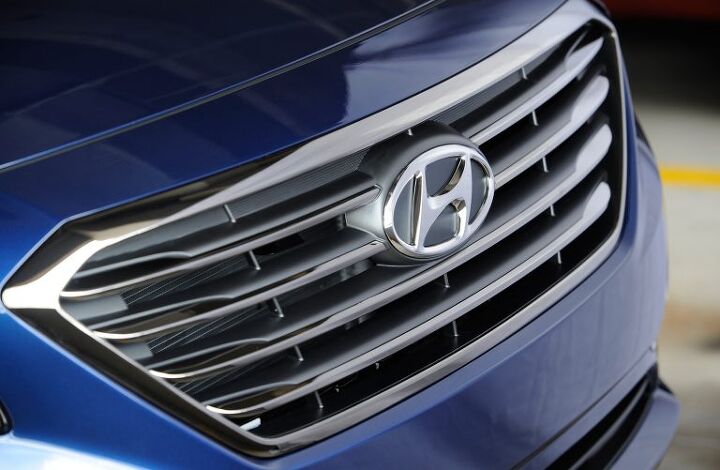




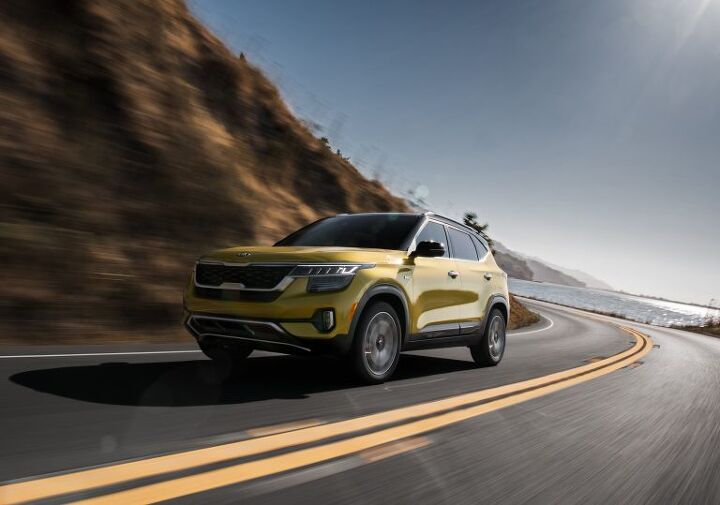


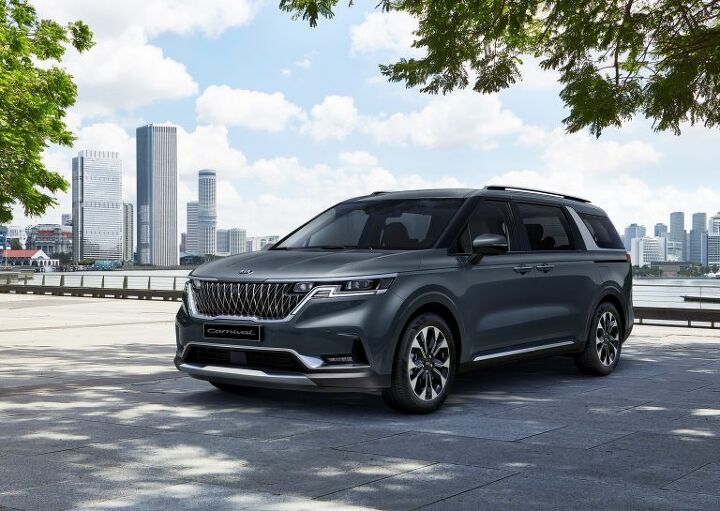

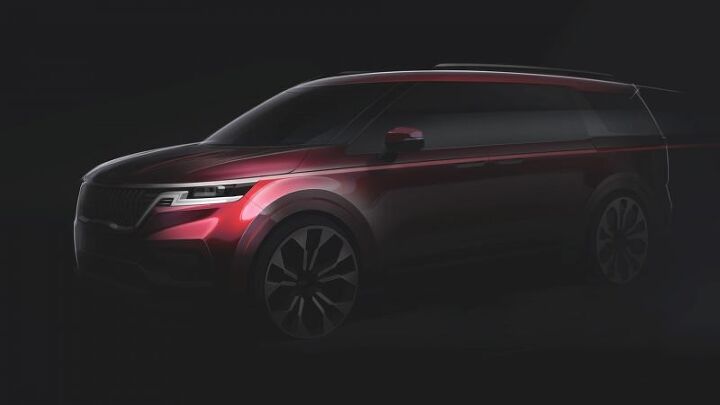
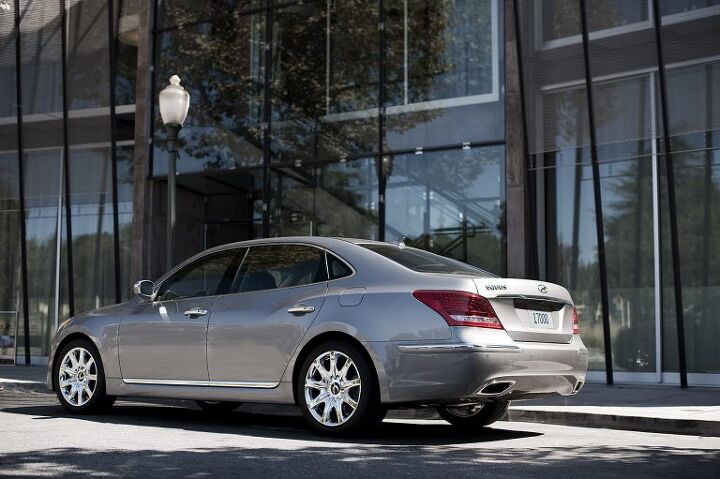
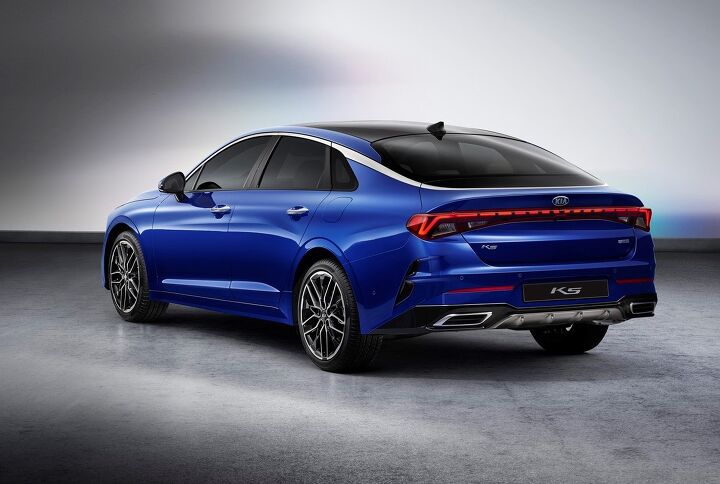












Recent Comments